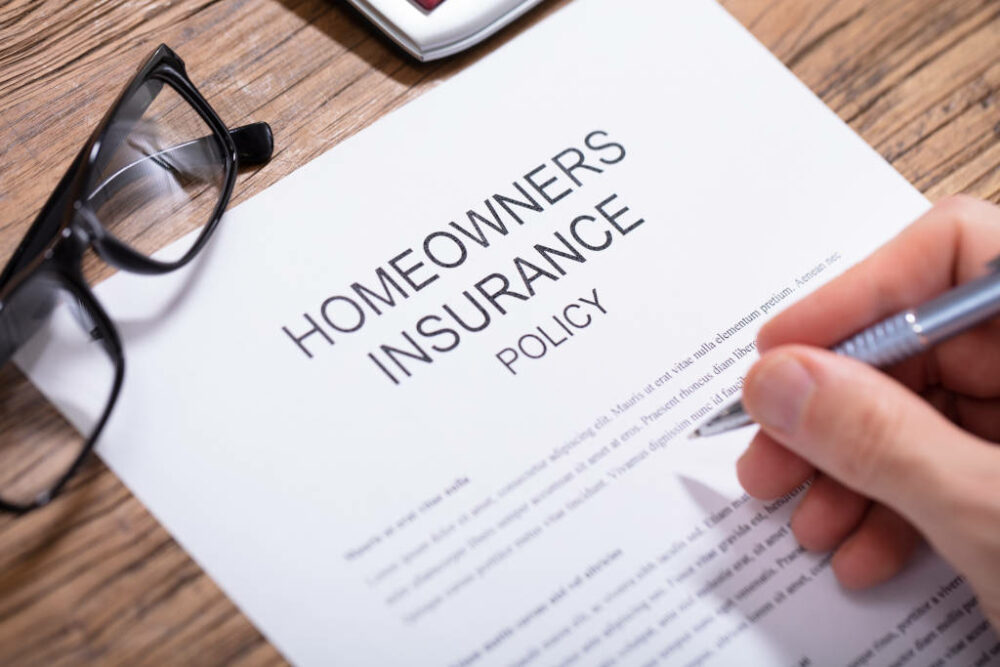If you own a home, you’re likely going to need to buy insurance coverage. But is it a requirement? Many think it is, but the truth is that it depends on your current situation. As it turns, many homeowners could skip insuring their houses without penalty.
Unlike car insurance, your state will not require you to have any homeowners coverage. But this doesn’t make you exempt from buying it. Financing a house will likely mean you’ll have no choice but to buy a policy. Your bank or lender will most likely require you to have it. This is because they also have a financial interest in your home.
In this article, we’ll take a look at the situations where home insurance is required. Some lenders might demand that you have a certain type of coverage, which we’ll spell out. We’ll also explain why buying homeowners is the best course of action regardless of any requirements.
When Homeowners Insurance Is Required
It’s common to take out a loan to buy a house. This also means that you’ll have to follow your lender’s requirements. They’ll likely require that you have a policy protecting your home. This is because they also have a financial stake in the property. So, they want to protect their asset from any perils that could cause expensive damages.
Lenders may also require you to buy other types of insurance for your home. This includes flood and earthquake coverage. It all depends on the amount of risk that your area of residence poses. Keep in mind that floods and earthquakes aren’t part of a standard homeowners policy.
Per the Insurance Information Institute (III), you might also have to get a policy if you buy a condo or co-op. This is because, when you buy a condo, you’re buying a stake in the entire building. The building owners or your bank lenders (if you have one) may require you to buy coverage. Typically, homeowners coverage for a condo only covers your specific unit and your belongings inside it.
Why It’s a Good Idea to Have a Homeowners Policy
Even if you don’t have to buy homeowners coverage, it’s still a good idea to do so. This helps protect your home from several types of random disasters. This includes common perils like:
- Fires
- Wind and hail
- Smoke
- Theft
- Vandalism
Note that these are not the only perils that home insurance covers. There are 16 perils that homeowners covers. The number of perils that you’ll have protection from depends on the type of policy form you choose.
Perhaps most importantly, a homeowners policy protects your bank account. Without it, you’d be responsible for paying for any damages that occur. In some cases, you could lose your house entirely.
The bottom line is that forgoing insurance could cost you in a big way later on. This is especially true if you live in an area that’s at risk for major storms or other natural events. Areas with high crime rates can also pose a real risk. Buying coverage for your house will help you save money and give you much-needed peace of mind.
How Much Homeowners Protection Do You Need?
The amount of homeowners insurance you need will depend on your current situation. In general, the idea is to buy as much as you can for maximum protection. But this isn’t an option for everybody. Still, you should be sure you have the right amount to ensure your home has enough protection to weather any disasters.
How much coverage you’ll need will depend on the price of rebuilding your house. Your limits should be, at least, enough to cover a rebuild of your home. Anything less would cause you to pay for some of it out of pocket. Your insurer will help you estimate how high your limits should be based on your house’s structure.
You can also take matters into your own hands and estimate how much a rebuild would cost. The III suggests multiplying the square footage of your home by “local, per square foot building costs.” You’ll need to get in touch with a real estate agent, builder, or insurer to find the local building cost.
It might also be a good idea to consider any improvements that you’ve made to the structure f your house since buying it. The materials that make up your home can play a role in the rebuilding cost. Certain materials might cost more than others. This can drive up the rebuild costs.
Other Considerations to Make
Homeowners coverage doesn’t just include the rebuilding of your house. You can also receive:
- Liability protection
- Personal belongings coverage
- Additional living expenses coverage
You should take stock of your personal belongings, including the price of each item. This way you’ll have a rough idea of how much it’ll cost to cover them.
For liability protection and additional living expenses coverage, it’ll be up to you to decide how much you need. Both usually come with a standard homeowners policy. The general idea is to buy as much coverage as you can afford. You may also decide to get an umbrella policy to protect you from liabilities that go over your limits.
How Soon Do You Need To Get Home Insurance?
As soon as you receive a mortgage for your house, you’ll need to acquire a home insurance policy. If you don’t get it in time, your lender could get force-placed insurance to ensure financial protection for their asset. This is where your lender buys coverage for the property when you haven’t done it yet. They buy it to protect their interests, rather than yours.
Force-placed policies are typically more expensive than regular ones. And the worst part is, you’d be the one paying these high rates. To avoid this scenario, be sure to buy homeowners right away when you finance a house.
You may also have to add your lender as a lienholder on your policy. Lienholders will have a stake in your property. Their stake ends when you fully pay back the loan on the property.
When No Insurance Provider Will cover Your House
Insurance is a necessity for most homeowners. But what if you’re unable to buy it? This can happen for a couple of reasons:
Your House Is High-Risk
Insurers may deem your home as high-risk. This happens if you live in a high-risk area. High-risk areas usually have one or more of the following:
- High crime rates
- Severe weather
- Natural disasters i.e., hurricanes, tornadoes, floods, earthquakes
If your home is “high-risk,” you can take advantage of the Fair Access to Insurance Requirements (FAIR) program. The FAIR plan puts you in a pool with insurers to ensure that you can get coverage. However, the rates in FAIR pools might be more expensive than normal. They may also have fewer coverage options, but it’s a surefire way to get protection for your house if you can’t otherwise.
You Have an Old House
Old homes may cause companies to deny you coverage. This is especially true if your house isn’t up to code. A couple of examples are extremely old and potentially dangerous plumbing or electrical systems. In this case, you can opt to make improvements to get your house back up to code. It might be a good idea to ask your insurer about what kinds of improvements you can make to be able to buy a homeowners policy.
Frequently Asked Questions
What happens if I don’t carry a homeowners policy?
This depends on if you have a mortgage or not. If you’re financing your home and decide to not buy coverage, your lender will likely buy it for you in the form of force-placed insurance. This is where your lender buys coverage to protect their interest in the property. But you’ll be the one paying for it. In general, force-placed rates are much higher than standard policies.
Without a mortgage, you’re free to decide whether you want insurance or not. But it’s probably a good idea to have it anyway. A random incident could cost you thousands of dollars. A home policy would help protect your finances and relieve stress in the event of a disaster.
Why do mortgage lenders require homeowners insurance?
Mortgage lenders require that you protect your house with an insurance policy because they also have a stake in your investment. They’re lending you a lot of money, so they need to make sure that their financial interests are safe. A random disaster could severely damage your residence’s physical structure and cost both you and them a lot of money or even the entire asset. Not only that, but people are less likely to pay off their mortgages if they can’t live in their homes. Homeowners coverage gets rid of all of these potential issues.
Why happens if I lose coverage and have a mortgage?
When you lose coverage, you’ll want to get it back right away. If you don’t, your lender could buy insurance for the property. This costs much more than a standard homeowners policy. Try not to have any lapses in coverage if you can help it.


